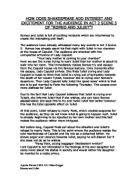Mercutio also uses many ridiculous examples and punning in his speech which adds entertainment for the audience. The exaggerated examples are humorous to the members of the audience who will understand them. “Thou would quarrel with the man that hath a hair more or a hair less.” A person would not count the hairs on the beard of a man. One of the puns Shakespeare uses does the same work as the ridiculous examples and interests the audience. “Thou wilt quarrel with a man for cracking nuts having no other reason but because thou has hazel eyes” is a clever pun because as well as hazel eyes you can get hazel nuts. This is an exciting and actually the only light-hearted part of the scene.
Shakespeare once again builds up tension and excitement in the audience when Tybalt flanked by other friends walks on stage. Mercutio says “By my head here come the Capulets” which shows by the tone of his voice that he is beginning to get worried that there might be another fight. The audience on the other hand are excited when there are two characters wanting to fight in a public place. Mecutio and Tybalt are using fighting talk such as “make it a word and a blow.” And they are also insulting each other “What, dost thou make us minstrels”. The audience are kept on the edge of their seat here because they know if this keeps on happening a fight will take place and the audience know what the dire consequences will be for the characters. This small section at the beginning of the scene is already building up tension within the audience.
Shakespeare also uses dramatic irony effectively in this scene. In Act 2, Scene 6 the priest agrees to marry Romeo and Juliet thinking this will stop the fighting. So straight after the marriage in the next scene Romeo says to Tybalt “I love thee more then thou canst devise.” This leads to Tybalt thinking that Romeo is mocking him and eventually to the point where Tybalt wants to fight him. Tybalt calls Romeo “boy” which raises more tension. Obviously what the priest has done has lead to more fighting. Tybalt does not understand that Romeo has married Juliet but the audience knows this, so the dramatic irony is creating tension.
Shakespeare has built up to a moment throughout the scene where the audience are expecting something of importance to take place. They are already excited with its dramatic and fast moving pace but it still comes as a shock however when there are the deaths of two main characters. By doing this Shakespeare has kept the audience interested constantly. The deaths are in contrast very different. The first death has Mecutio using dramatic language, the most memorable of which is when he says a “plague on both your houses.” The audience will get excited because this is such a dramatic line. The audience are expecting no more of this scene so they are kept enthralled when Tybalt also dies a dramatic and sudden death. Also the fact that Romeo, who is the supposedly innocent Montague kills Tybalt shocks the audience further.
At the end of this scene the audience are already in shock because of the passing of the two main characters, so it is enough that it has been dramatic. However Shakespeare makes the end of the scene dramatic by introducing many characters onto the stage. Lady Capulet, Prince and Montague all make an entrance giving a sense that the scene is very important to what the outcome of the play. Shakespeare once again interests the audience by having the Prince give another dramatic speech. “Immediately do we exile him hence”. This speech talks of Romeo being exiled and that he will be killed if he returns. “I will be deaf to pleading and excuses” shows the audience that what Romeo has done is unforgivable. The tone of voice in which the Prince says this will make the audience know this is a very important part of the play. They would be shocked as to what has happened in the scene and it would be a shock for them seeing as the main character has been banished. This would also shock them because they would not understand how his and Juliet’s relationship would conclude. But as we know the deaths of these characters also leads to the death of the Romeo and Juliet.
During this scene Shakespeare’s techniques constantly flow on to each other. Shakespeare delights the audience throughout the scene with the many important happenings, such as the banishment of Romeo. As the death of Tybalt leads to Romeo’s exile and therefore to all the other parts that take place you could say that this was one of the most important scenes in the play. The audience may want to take in to account the other parts that will lead to the death of the Romeo and Juliet such as if the families had not been feuding in the first place but none the less their fate could not be changed. The quote “For never was there a story of more woe, than this of Juliet and her Romeo” not only summarizes the play but this scene as well. The audience has always been kept interested and excited throughout this momentous scene.







